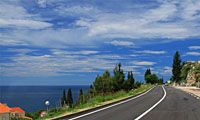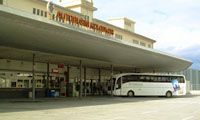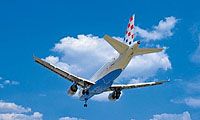The scenery of Croatia
Whether traveling by land or sea along Croatia's shoreline, you are guaranteed a voyage of spectacular scenery and breathtaking views. The bare mountains running like a spine down the coast, the translucent Adriatic and the picturesque towns are surrounded by more than a thousand islands anchored offshore.
The fact that most of these islands are uninhabited make them the ideal destination for those who want to get away from the crowds.
Need to rent a car or arrange for private transfer service?
We also arrange whole or half day private excursions to the surroundings of Dubrovnik, and can organize airport pickups for individuals and groups. Please contact us for more information.
There are many offers on cheap flights from most European cities if you should wish to visit. The price of internal flights in Croatia is sometimes cheaper than taking a train or bus.
Croatia is rapidly improving its road infrastructure. Croatia is integrated into the European road marking system. European roads have the mark "E" and highway roads "M". The most picturesque route in Croatia is considered to be the Adriatic highway (Jadranska magistrala) which connects Rijeka and Dubrovnik.
Getting around Croatia and Dubrovnik by ferry is both efficient and maddening as you try to figure out the ferry schedule, check out the ferry timetables for Dubrovnik and Croatia.
Customs
Custom duties are not paid on personal objects. Professional and technical equipment of sustainable value should be reported upon entering Croatia. Foreign currency can be imported and exported freely.
Documents and regulations
There are several documents travelers need to have available on their trips across Croatia: a valid passport, a valid International driving license, the vehicle registration card and insurance. Please note that valid insurance is obligatory. The wearing of seat belts is also required, both in the cities as well as driving through the countryside. When entering Croatia, all damage on the vehicle must be reported at the border office. Once in Croatia, all tourists are required to register upon arrival at their destination. If you are staying in a hotel, private accommodation or camp this will generally be done automatically for you. Tourists may remain in Croatia for up to three months on their tourist visas.
Visa regulation
All citizens of the countries for which entry visas are requested according to Visa Regulations of the Republic of Croatia, must as a rule, obtain the visas abroad prior to the entry into the Republic of Croatia by applying to the related Embassy or Consular Office of the Republic of Croatia. There is a possibility of issuing entry visas through a special procedure if requested by a legal entity or an individual in the Republic of Croatia by applying for visas to the relevant authorities in the Republic of Croatia (Police) for citizens of countries in which Republic of Croatia has no embassy or consular office.
Visa requirements overview for Croatia
Ministry of Foreign and European Affairs, Visa requirements overview
The visa requirements overview for Croatia was taken from the >Ministry of Foreign and European Affairs web page. More on visa and passport regulations and other legal issues: Ministry of Foreign Affairs, Ministry of Foreign and European Affairs
Search, Compare & Save
Compare prices from leading suppliers and find great deals in over 60000 locations worldwide.
No Hidden Costs - 24/7 Support - Free Cancellation
500+ Trusted Suppliers. Big Brands. Huge Choice. Massive Savings!
Driving in Croatia
The minimum driving age within Croatia is 18. For motorcycles the wearing of crash helmets is required for both the rider and the passenger. Dipped headlights must be used at all times.
Traffic regulations are similar to those enforced in other European countries. Croatia uses right-hand traffic with general speed limits of 100 km/h on overland roads, 130 km/h on motor ways and 50 km/h in built-up areas. While driving along the coast in Dubrovnik or the Dubrovnik Region, you may encounter many places where the speed limits are lowered. If you plan on driving to Dubrovnik in the winter, you may encounter tough travel conditions, especially in the Gorski Kotar Region. Winter tires are essential and it is strongly recommended that you bring along snow chains as well.
Drunken driving is punishable and can lead to confiscation of the driving license and severe fines. The permissible alcohol limit is 0.5 promiles.
24-hour information is provided by the Croatian Automobile Club:
HRVATSKI AUTO KLUB - Information center, Tel: +385 1 4640-800, web: Hrvatski autoklub





